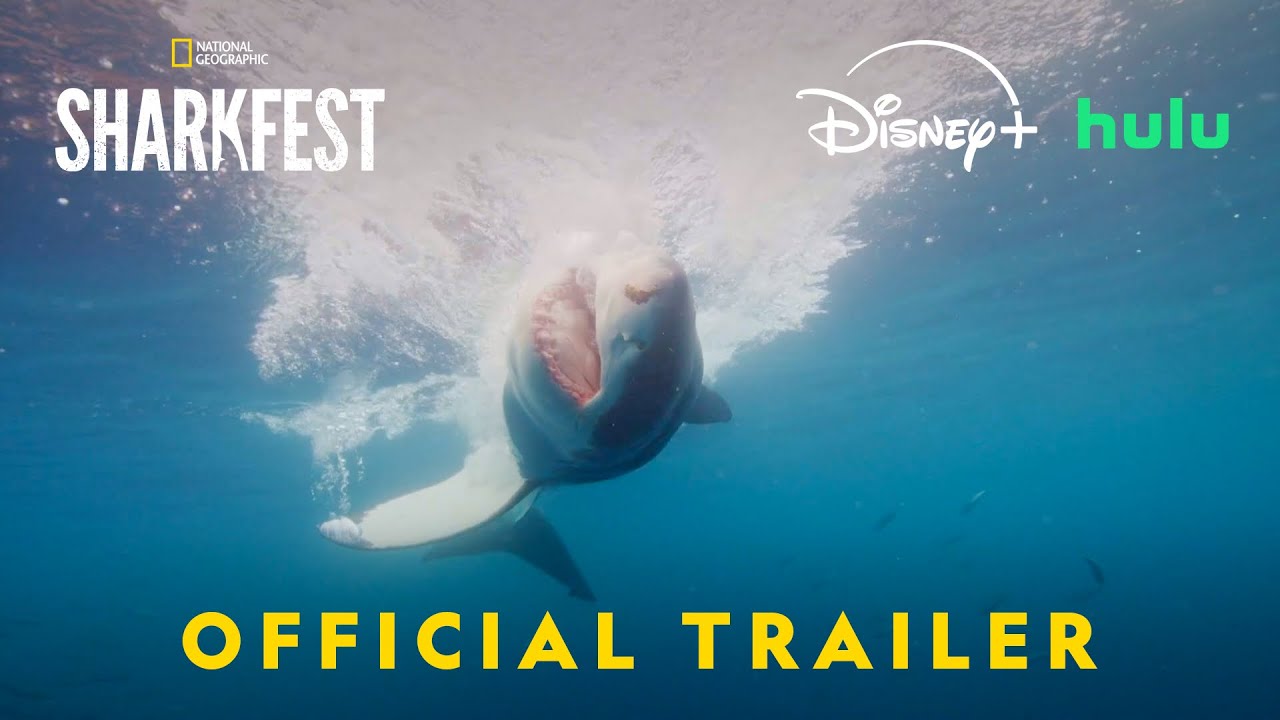It’s summertime, which means the arrival of all things shark-related on National Geographic. National Geographic’s SHARKFEST returned this June and made itself at home. Throughout the course of the month, viewers have been graced with a whole array of educational, fun, and impactfully curated programs, bringing them closer to these amazing oceanic creatures.
One of the series viewers can watch now on Disney+ and Hulu is Investigation Shark Attack, where an incredible panel of marine scientists analyzes and theorizes about individual shark encounters and the factors that led to these incidents. The locations of these cases range from the Bahamas to the shores of Texas and the balmy shores of Southern California, giving viewers an idea of the nuances and complexities of sharks in each region.
In Investigation Shark Attack, Dr. Megan Winton tackles all things data-related in this team of marine scientists. Her professional experience in statistical analysis comes in handy in these episodes, and viewers are in for a treat to see how these methods help researchers get closer to an answer.
For Investigation Shark Attack, But Why Tho? got a chance to chat with Dr. Megan Winton, where we discussed how the team narrows down their scope, the breakthroughs scientists have had with the incorporation of the latest technologies, and how climate change is impacting shark research.

BUT WHY THO: Diving into Investigation Shark Attack, you guys deal with so much data. Can you discuss your approach to tackling the data and narrowing the scope in these instances?
DR. MEGAN WINTON: That’s such a great question. A lot of the work I do as a shark scientist involves the statistical side of things, dealing with the huge data sets we’re bringing in, which can definitely be challenging. And, as you mentioned, it can be overwhelming sometimes with all the data we have available to us these days, with all the amazing types of technologies we’re using to study sharks now.
For example, one of the tag types we’re using to study Great White sharks here off of Cape Cod is these camera tags that are also outfitted with an array of 3D sensors that record everything that the shark is doing and different aspects of the environment 20 times a second. So when we go out and retrieve those tags after they’ve been on the sharks for a few days, we have millions of data points just from that one tag deployment.
It’s a huge part of the job that people don’t often think about. They think about shark scientists, and they think about going out on boats, tagging sharks, and observing sharks in different ways. But a lot of the real work happens when we get back to the lab and we start going through all of these data streams.
One way we try to make it manageable is [that] we set out with specific questions to answer using these different technologies. So we’re collecting data to answer certain questions. We know in advance how we’re going to do that, but some of the models that I run to analyze shark behavior, looking at shark abundance, trends, distribution, and things like that, will take days to run on a computer.
It involves a lot of coding, but it’s really one of my favorite parts of the job. It’s challenging, and it’s kind of like putting together the pieces of the puzzle and trying to pull out the big trends from what is often really noisy data.
But one thing that I’ve also loved about that side of the work is that the more we’ve dug into it, and the more we study individual sharks, the more we appreciate individual variation in sharks. Just like people, not all people are alike, and not all sharks are alike.
Some people are homebodies. I’m a homebody. Some people are out and about and doing big exploratory things, and the same things apply to sharks as well, and that’s been a very cool thing that we found out as we’ve continued research, and as the technology has gotten better. The analytical techniques to analyze the data we’re collecting have gotten better as well.
Dr. Chris Lowe is one of several consulted by Dr. Megan Winton, Candace Fields, Dr. Mike Heithaus and Gibbs Kuguru in Investigation Shark Attack.

BUT WHY THO: You guys, along with Dr. Chris Lowe, mentioned camera tags in Investigation Shark Attack, but also drone footage, and how that’s helping relay to the general population how mostly harmless sharks are. Can you talk a little bit about how these technologies are sort of broadening our understanding of shark behavior in terms of cracking down on those negative stereotypes that, unfortunately, my side of the media has perpetuated over the years?
DR. MEGAN WINTON: Don’t worry, I don’t hold you personally responsible. It’s one of the most exciting things about being a scientist right now. I feel so lucky to get to be a scientist in this day and age, because the technology has come so far. You mentioned the camera tags, which are one of my favorite pieces of shark spy technology available today, because what they allow us to do is essentially to just ride on the back of a shark and see everything it does, which takes a lot of guesswork out of making sense of what all those data points that we collect using other techniques are.
Drones have been another big game changer because they allow us to spy on these animals from above, not interact with them or influence their behavior in any way, and just see what they would do in the course of their normal sharky day. That’s been a game changer as well, and it’s really helped transform our understanding of these animals from a scientific perspective.
But one thing that I love about all the video-based technologies that are out there today is [that] it makes it easy to demonstrate to the public as well. Instead of us showing a bunch of charts and graphs and looking at trends, trying to illustrate these points and teach people about sharks, now we can show them a video of a shark with a camera tag checking out a buoy, or getting zapped by a torpedo Ray, or doing remotely non-scary things and demonstrating that they’re these very curious fish.
They’re very selective, cautious predators. We’ve seen sharks get scared by things. We’ve had birds dive in next to them while they have a camera tag on them, and you can see the shark go like, “Oh my gosh, what was that?” And like, take off. And it has allowed us to see a side of sharks that we haven’t been able to see before, which has been really cool.
“It’s a very cool time in Shark science right now.”

BUT WHY THO: Yeah, I thought it was really cool in one of the California episodes, with the hemispheric sleep pattern. I had never even heard of that before, and here we have captured drone camera footage of just that particular fun bit of data and behavioral pattern.
DR. MEGAN WINTON: Which is amazing. That’s something [that] wasn’t really possible to observe directly before. And who would have thought, like, nobody really knows much about shark sleep, but who would have thought that they just Zen out and do circles and until they’re ready, rested up and ready to go, and there’s still a lot about it we don’t understand, but that is a really great example of some of the new things we’ve learned about sharks using some of these technologies.
I mean, off of Cape Cod, we’ve seen a shark with a camera tag on it that had seal intestine hanging out of the side of its gills, because they’re messy eaters. We knew she had just eaten, and she swam offshore, sat on the bottom, and pointed her head into the current so [that] the water would keep flowing over her gills so she could breathe. But we always thought this was a species that had to keep swimming all the time to breathe, so that was one of those things.
It sounds boring, probably from the perspective of most people like, “oh, you saw a shark sit on the bottom. Yawn.” Give me something good, right? But, for us, that was one of the most exciting things that we’ve documented with that technology because we had no idea that they did that. So, it’s a very cool time in Shark science right now.
It’s downright smart. I was like that shark essentially just finished his Thanksgiving dinner, and is like me going to the couch and putting my sweatpants on and lying there after I had a really awesome meal. So that was really cool to see. And the drone work that has been done on the West Coast in Chris’s lab has been really awesome as well, in demonstrating to people just how uninterested in people sharks are most of the time.
I think when drone video footage of sharks, particularly Great White Sharks, off of beaches, swimming past surfers, first started to come out, people freaked out, and they still do. But it is a testament to the fact that these animals have been there.
They’ve been doing this the whole time, and by and large, not taking an interest in people, even though sometimes they do make mistakes, right? But people just didn’t know about it because there was no way to observe this. That has really transformed people’s understanding of sharks and their use of our nearshore waters, as well as their use of waters off beaches where you might go if you live in Southern California.
“Thinking of ways to monitor for these changes is really important and a pressing issue.”

BUT WHY THO: How are you guys adjusting your data collection and your data scope to start accommodating for what is essentially a quickly changing and unpredictable variable with warming waters and climate change?
DR. MEGAN WINTON: That’s such a great question. These changes are happening really rapidly, and I’m based up in New England, where this portion of the ocean is one of the most rapidly warming on the planet. We’re certainly starting to see species that we think of as warmer water species make appearances up here.
We’re very interested in documenting how sharks that are seasonal visitors here now, such as Great White Sharks, how those trends might change over time. Are they going to start arriving earlier? Are they going to stay longer? Could they potentially, at some point, become year-round residents of New England waters, because now it gets too cold in the winter, and they head south?
These are all things that are on scientists’ minds, and thinking of ways to monitor for these changes is really important and a pressing issue. And what folks are doing in a lot of cases are there are these long term surveys, or relatively long term monitoring programs, and it’s making sure we can secure funding to continue those monitoring programs so we can assess how things might change in relation to how they are today or a decade ago, or in some cases where there are long term surveys multiple decades ago.
So keeping these programs going, keeping funding and support for them, can be tough, but realizing that we’re in it for the long haul, and that we know things are changing. We want to stay on top of it as scientists, and I think members of the public, everybody’s noticing these changes that they live in coastal areas, and they’re concerned about them, and things are changing, I think, more rapidly in a lot of cases, than most people ever anticipated. So it’s definitely one of the most pressing issues right now for shark science and just marine science as a whole.
“These animals, sharks and other marine animals included, are so in tune with their environment that they’re often the sentinels.”

BUT WHY THO: I was thinking of the incident in Monterey that you guys covered, where you had the shark showing up in an off season point for shark migratory behavior in the area, and thinking, well, possibly that’s related to warming waters, and also just the moving further northward on the Pacific side too, just thinking about how all that changed within the past decade.
DR. MEGAN WINTON: Yeah, and it’s been a period of rapid change in a lot of places, and in a lot of cases, these animals, sharks and other marine animals included, are so in tune with their environment that they’re often the sentinels, right? So, we’ll see changes happening out in the ocean, in these coastal areas, and notice things that we haven’t seen before. And in some cases, it’s alarming.
In some cases, like we have off the coast of New England, it is partially driven by species that were fished down for a long time, are now making a comeback. And in some cases, like the case of Great White Sharks off Cape Cod, they’re actually coming home. We know they used to be here. They’ve been gone for a long time, and now they’re making a comeback.
But that speaks to the need for these long-term monitoring programs, because shark science didn’t even become a thing until most shark populations started to tank. So we don’t have great historical data on a lot of them, which makes our jobs now trying to tease apart all these different complex factors even harder, but it’s a very challenging, challenging question to try to tackle right now, but it is a very pressing one.
“Coding and data analysis are going to be increasingly important skills for marine scientists to have as we enter this time of big data.”

BUT WHY THO: For kids who may be reading this, be prepared to do a lot of math, because that’s what scared me away from marine science after I found out how much math was involved.
DR. MEGAN WINTON: I will say, for those kids, math is really fun. I was not into math in a big way when I was a kid in school, because I was like, I’m going to be a biologist. I don’t need to worry so much about math, and it wasn’t until I got to college [that] I learned how valuable math and data analysis [were], and I realized when I started applying to my own data set and using it to answer questions that I had about these animals, it suddenly became immensely fun.
It’s still challenging, but in a way, it makes you a much better biologist, understanding how to analyze your data and knowing how to get at those questions. It made it so much more fun than just answering random math questions that were assigned in class. So I hope kids realize there are really awesome applications for math outside of what you do day-to-day in the classroom. It’s a very important skill. That, and coding and data analysis, are going to be increasingly important skills for marine scientists to have as we enter this time of big data.
“The fact that we could possibly scare sharks seems ridiculous to many people.”

BUT WHY THO: To wrap things up, what are you hoping for viewers to take away from Investigation Shark Attack? For me, one of the things I took away was that there are so many factors to consider when it comes to what could lead to shark attacks. It’s not just a simple act of us looking tasty because we’re not. We’re bony and disgusting. It’s a lot more than that.
DR. MEGAN WINTON: It’s so true. I obviously can only speak for myself, but I think all of the other scientists involved would say as well, is that we want people to see sharks the way we see them, as people who study them every day. We want to convey the complexity of understanding what they do. But we hope this sheds light on different sides of sharks that people might not have been aware of before.
A lot of people I talk to, my family included, even though I’ve been talking to them about sharks ever since I was a kid, are afraid of sharks. But I think they don’t realize that sometimes, when sharks bite people, it’s not, like you said, just a case of mistaken identity. Sometimes it might be that person is scaring that shark or stepping on that shark, when that shark is just swimming around looking for its next fishy meal.
Sometimes humans can scare sharks, which I think really surprises a lot of people. They think of sharks as these big, tough, invincible, almost apex predators. The fact that we could possibly scare sharks seems ridiculous to many people.
I think a lot of the topics we cover over the course of the show will shine a light on these other sides of sharks, and that in some cases, scientists are just starting to learn about [how] sharks might have personalities, the complexity of shark learning and how capable they are of learning, which a lot of people think of sharks as just these kind of dumb swimming noses that are out there just looking for food. But they don’t think of them as animals that can learn.
I really hope people come away with an appreciation for that and also just get a glimpse into what it’s like to be a shark scientist. For those young kids and up-and-coming marine scientists, I hope it gives them an idea of where this field is going and how much work there is still to be done, and how important that is for the conservation, not only of sharks, but for the oceans in general.
Did you miss National Geographic’s latest SHARKFEST series, Investigation Shark Attack? It is streaming now on Disney+ and Hulu.








